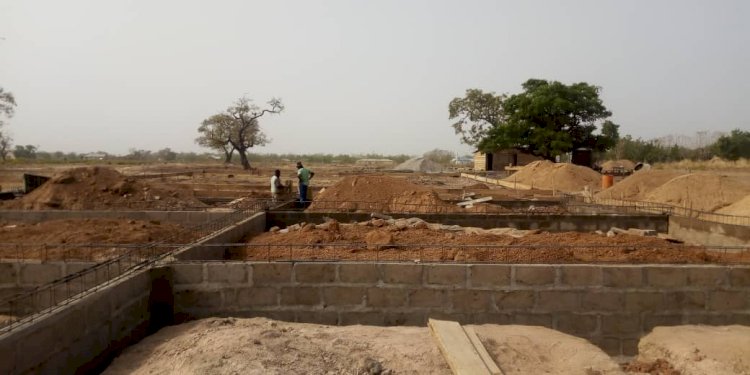Savelugu Rice processing factory progressing steadily

Work on the construction of a rice processing factory under the government flagship One District, One Factory program in the Savelugu Municipality is progressing steadily.
The construction is about 30% complete and expected to be completed in eight months, however, the contractor in charge, Guruma Twins Limited is hoping to complete it in six months.
The factory when completed will help salvage the postharvest loses rice farmers in the region usually suffer. The ultramodern factory comes with an administration block, a canteen and a warehouse.
Operation
Savelugu Municipal Agric director, Alhaji Ahmed Mohammed Adam on the operations of the factory, said the factory when ready will be operated by shares. Commercial rice farmers in the region, he said would be invited to buy shares and be part of the factory’s ownership. According, Alhaji Ahmed, some farmers in the Municipality have been identified already and are ready to buy shares.
On her part, the MCE for Savelugu, Hajia Ayishetu Seidu indicated that, the factory will start operation as soon as it is completed and handed over by the contractor. She noted that, the project is dear to the government, considering the challenges rice farmers in the region goes through to get market for their produce and therefore will not waste time to start operations when completed.
Rice Production and Consumption in Ghana
According to Kula and Dormon (2009) Ghana’s rice production assessments range from 200,000 to 300,000 MT of paddy of which the bulk comes from the Upper East, Northern and Volta Regions.
The rice production coming from Upper East is estimated to be 27%. In Ghana, substantial amounts of rice are produced in all regions except central. However sixty percent (66%) of the national production comes from Northern Ghana.
Rice Postharvest Loses
Even though 60% of rice produced in Ghana comes from Northern Ghana, rice farmers from that part of the country continuously suffer postharvest loses. These farmers situation is bedevilled with lack of combine harvesters during the peak harvest season.
Other challenges the farmers face is at the farm gates where tons of rice remain uncollected for a long time due to unavailability of transport, storage facilities, pest and processing. Last year, rice farmers at the Fumbiisi rice valleys in the Upper East Region sold their produce at rock-bottom prices to market women for need of cash to settle debts incurred in the course of production.
These debts were incurred as a result of lack of combine harvesters to harvest their produce leading to a competition over the only available one. They sold three bags of rice for the price of two, each bag costing GH¢220.00.Ghanaians have been encouraged to purchase rice produced in Ghana to reduce the importation of rice and also to keep rice farmers in business.







